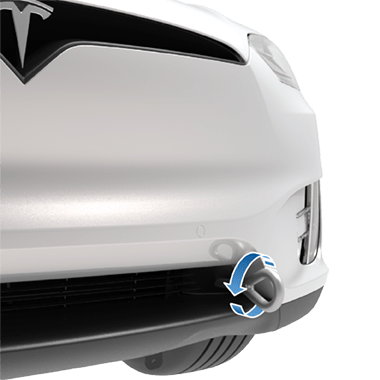Instructions for Transporters
DO NOT TRANSPORT WITH WHEELS ON THE GROUND
The front motor in Model X generates power when the wheels spin. Always transport Model X with all four tires off the ground. Ensure that the tires are unable to spin at any time during transport.


Do not transport Model X using any method that is not specified by Tesla. Adhere to the instructions provided in the following sections and observe all warnings and cautions provided. Damage caused by improper transporting of your vehicle is not covered by the warranty.
Approved Methods for Transporting
A flatbed truck or comparable transport vehicle is the recommended method of transporting Model X. The vehicle can face either direction when using a flatbed.

If Model X must be transported without a flatbed truck, then wheel lifts and dollies must be used to ensure that all four wheels are off of the ground. This method may only be used for a maximum of 55 km, and must not exceed the manufacturer speed rating of the dollies. With this method, Tesla recommends the vehicle facing forward so that the front wheels are lifted and the rear wheels are on dollies.

Disable the Self-Leveling Air Suspension System
If Model X is equipped with the air suspension system, it automatically self-levels, even when power is off. To prevent damage, you must activate Jack Mode to disable self-leveling:
- Touch on the touchscreen.
- Press the brake pedal, then touch Very High to maximize height.
- Touch .
Activate Transport Mode
Transport Mode keeps the parking brake disengaged while winching Model X onto a flatbed truck. When active, Transport Mode displays a message indicating that the vehicle will remain free-rolling. The following are required to enable Transport Mode:
- Low voltage power is required. You are unable to use the touchscreen to activate Transport Mode if Model X has no power.
- Model X must detect a key fob. Transport Mode is available only when a key fob is detected.
- Ensure the vehicle is not connected to a charger. Transport Mode is not available if Model X is still plugged in.
To activate Transport Mode:
- Ensure the vehicle is in Park.
- Chock the tires or otherwise ensure Model X is secure.
- Press and hold the brake pedal, then on the touchscreen, touch . The touchscreen displays a message reminding you how to properly transport Model X.
- Touch Enter Transport Mode. The button turns blue to show that Model X is now in Transport Mode. Model X is now free-rolling and can be rolled slowly (no faster than walking speed) for short distances or winched (for example, onto a flatbed truck).
To cancel Transport Mode, touch Exit Transport Mode or shift Model X into Park. If your phone key is not detected, canceling Transport Mode powers off Model X. You may need your key card to restart your vehicle.
Pull onto the Flatbed Truck - With Tow Eye
- Locate the tow eye.
- Remove the tow eye cover by inserting a small flat screwdriver into the slot located along the top of the cover, then prying gently to release the cover from the top snap.
 NoteKeep the tow eye cover in a safe place so you can replace it when towing is complete.
NoteKeep the tow eye cover in a safe place so you can replace it when towing is complete. - Fully insert the tow eye into the opening, then turn it counter-clockwise until securely fastened.

- Attach the winch cable to the tow eye.CAUTIONBefore pulling, make sure the tow eye is securely fastened.
- Activate Transport Mode by touching .
- Pull Model X slowly onto the flatbed truck.
Pull onto the Flatbed Truck - Without Tow Eye
It is strongly recommended that you connect the winch to your vehicle's tow eye, as described previously. However, if a situation arises in which the tow eye is not available (lost, misplaced, etc.), the following instructions describe how to attach tow straps.
- Attach the tow straps to each of the lower suspension arms underneath the front of the vehicle.

- To protect the underbody from damage, place a protective barrier (such as a piece of wood) between the tow strap and underbody.
- Activate Transport Mode by touching .
- Pull Model X slowly onto the flatbed truck.
Secure the Tires
The vehicle's tires must be secured onto the truck using the eight-point tie-down method.
- Ensure any metal parts on the tie-down straps do not contact painted surfaces or the face of the wheels.
- Do not place tie-down straps over body panels or through the wheels.

If Vehicle Has No Power
If Model X has no low voltage power, perform the following steps to open the hood or jump start the low voltage battery.
- Open the hood. See Opening the Hood with No Power for more information on opening the hood if the vehicle does not have power.
- Jump start the low voltage battery (see Jump Starting).